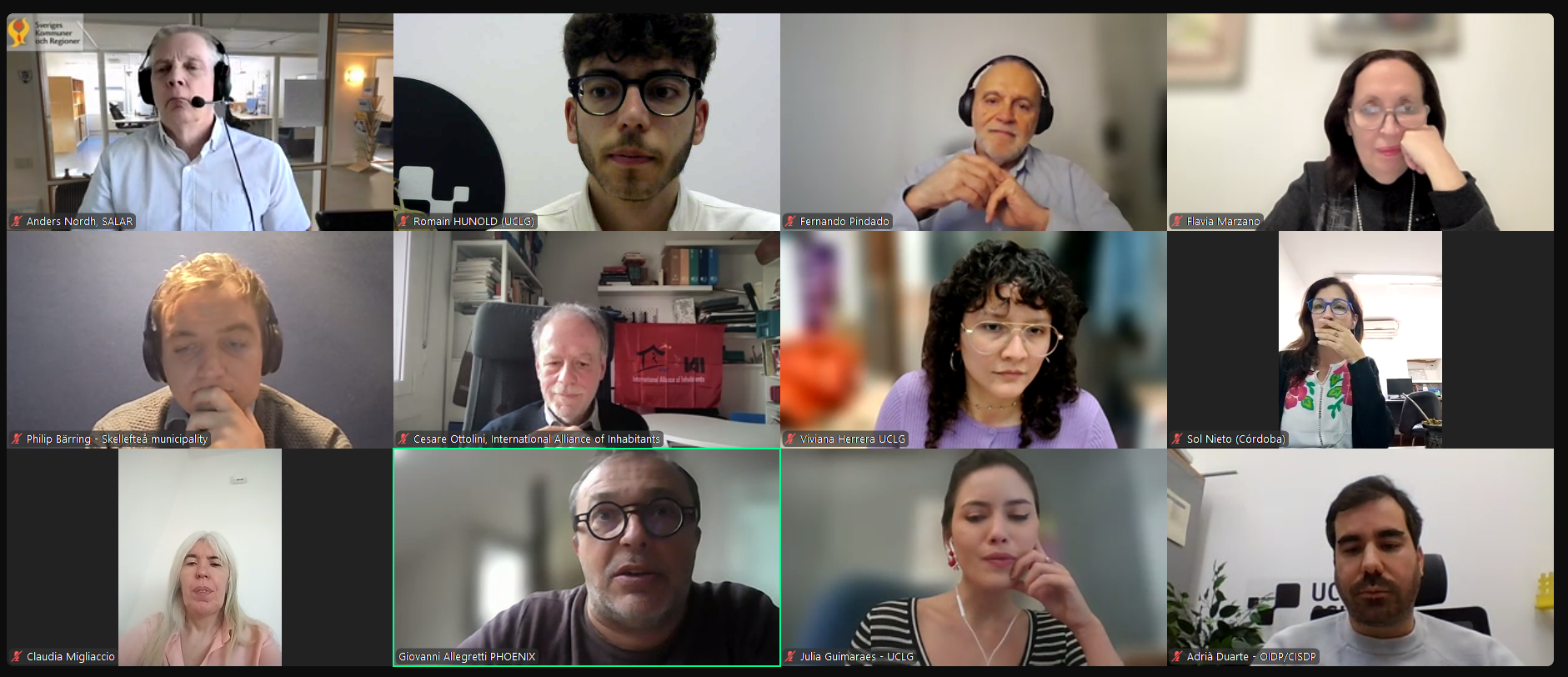How do we ensure AI is at the service of democracy and not the opposite? Local governments and experts shared their experiences in our webinar.
On 21 March 21 2025, the International Observatory on Participatory Democracy (OIDP) co-facilitated a webinar titled “Artificial Intelligence and Local Democracy: What Are We Talking About?,” in collaboration with the United Cities and Local Governments Committee on Social Inclusion, Participatory Democracy and Human Rights (UCLG-CSIPDHR), the International Alliance of Inhabitants (IAI), the PHOENIX Project/CES - University of Coimbra, and the International Association of Facilitators (IAF). The session gathered experts, local governments, and civil society representatives to unpack the role of AI in democratic governance, citizen participation, and human rights protection.
The session was kicked off by Adrià Duarte, OIDP Coordinator, who framed the discussion with a powerful call: “AI is reshaping governance—how do we ensure it strengthens democracy instead of undermining it? AI should be at the service of democracy, not the opposite.”
Setting the Stage for OIDP Córdoba 2025
Juan Domingo Viola, Secretary of Citizen Participation of the City of Córdoba, Argentina—host of the upcoming OIDP Córdoba 2025 Conference—opened the session by emphasizing the relevance of this debate as a step toward the agenda of our annual gathering: "Connecting, Integrating and Humanizing Cities in the Challenge of Building Community."
Click here to register for our OIDP Córdoba 2025 Conference!
Framing the Debate: AI as Political and Ethical Imperative
Flavia Marzano, expert in AI and Open Government in Italy, offered a clear message: AI is not neutral. She presented the European AI Act as a significant step toward ethical regulation but warned about persistent biases—gender, racial, socioeconomic, age, and disability-related—that AI systems can perpetuate.
"AI and democracy must go hand in hand to empower citizens."
Marzano stressed the need for bridging the digital divide, fostering digital literacy, and building ethical frameworks—especially in participatory processes.
Click here to view Flavia Marzano’s presentation slides
What Kind of Democracy in the Age of AI?
Michelangelo Secchi, researcher and collaborator with OIDP, presented a nuanced reflection on the pervasiveness of AI in our deliberative environments. He reminded participants that AI is “everything, everywhere, all at once,” and questioned how to ensure transparent governance of such a hybrid, opaque system.
"The ‘quality’ of AI is our ‘what’ when taking action."
Secchi explored how large language models (LLMs) could be used to summarize debates, assist moderation, and even expand civic networks—but warned about new exclusions and the risk of disempowering human agency.
Click here to view Michelangelo Secchi’s presentation slides

Local Practice from Sweden: AI in Participatory Urban Planning
Representatives from the City of Sundsvall, Ulrika Sjöberg and Andreaz Strömgren, shared a concrete example of using AI to support urban planning dialogues with residents.
AI helped synthesize large volumes of input, but they cautioned against over-relying on generative tools that might invent content or overlook human nuance.
Click here to view the presentation slides of the City of Sundsvall
Ethics and Facilitation: The Role of Human Mediation
Gerardo de Luzenberger from the International Association of Facilitators (IAF) reminded the audience that AI is just a tool—like a post-it once was. But its use must be intentional. "We must ask how AI helps or hinders facilitation. And we must raise these questions even more urgently where democracy is under threat."
AI and the Right to Housing
Cesare Ottolini of the International Alliance of Inhabitants urged caution about AI’s role in exacerbating urban inequalities, particularly through rising rents and speculative development. He called for a global democratic platform involving civil society, local authorities, and the UN to co-create ethical tools. "If we let AI decide, there will be no participatory democracy."
Conclusion: A Collective Challenge
The webinar made clear that the use of AI in local democracy is not only a technical issue but a political, ethical, and human rights challenge. As we move toward the OIDP Córdoba 2025 Conference (May 21–23), the OIDP community is committed to continuing this conversation, ensuring that AI serves people—not the other way around.